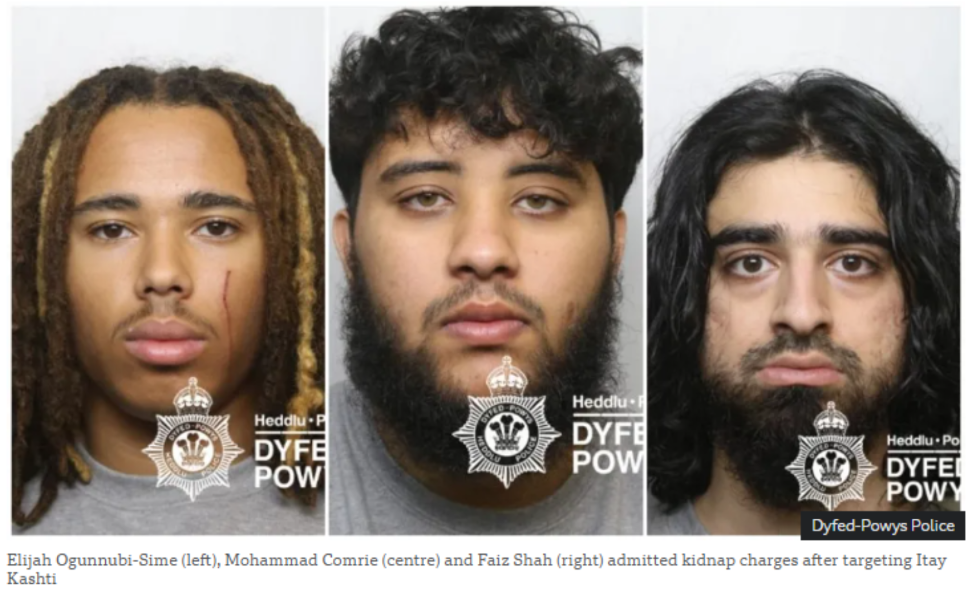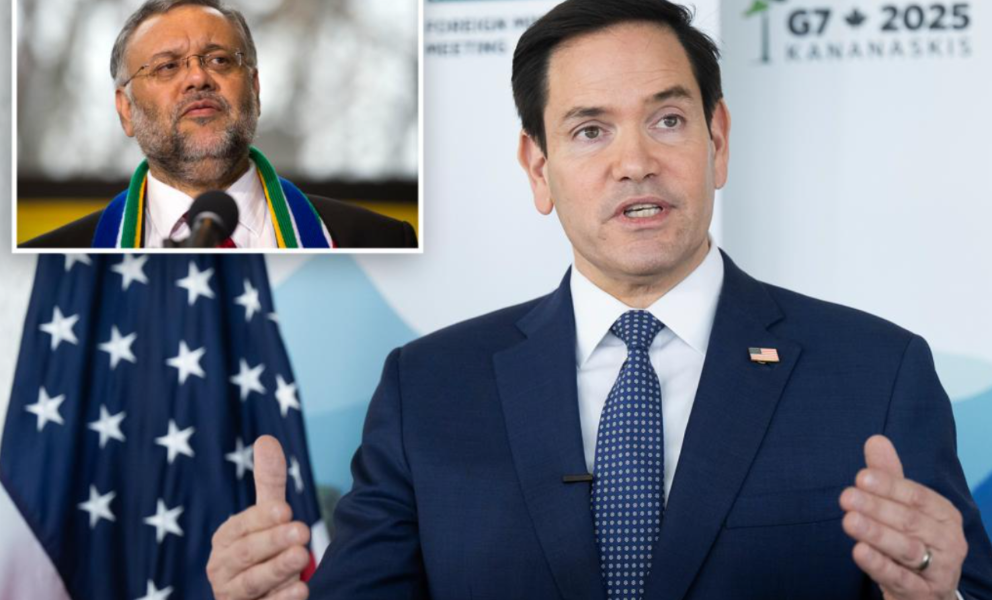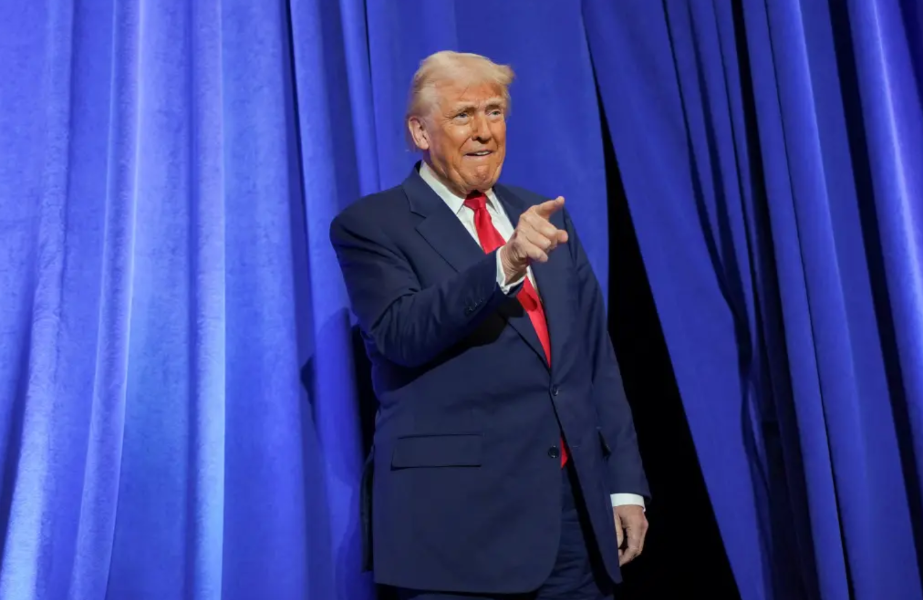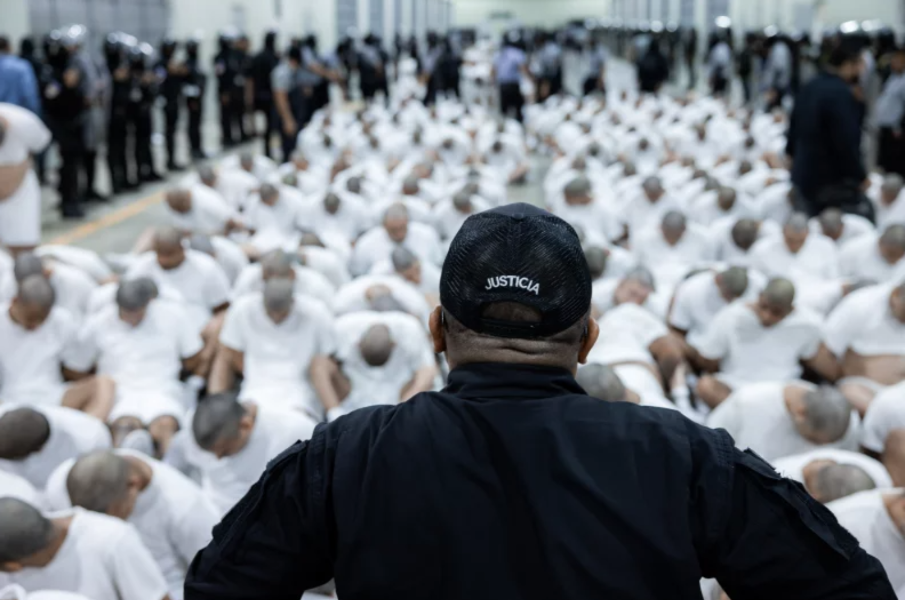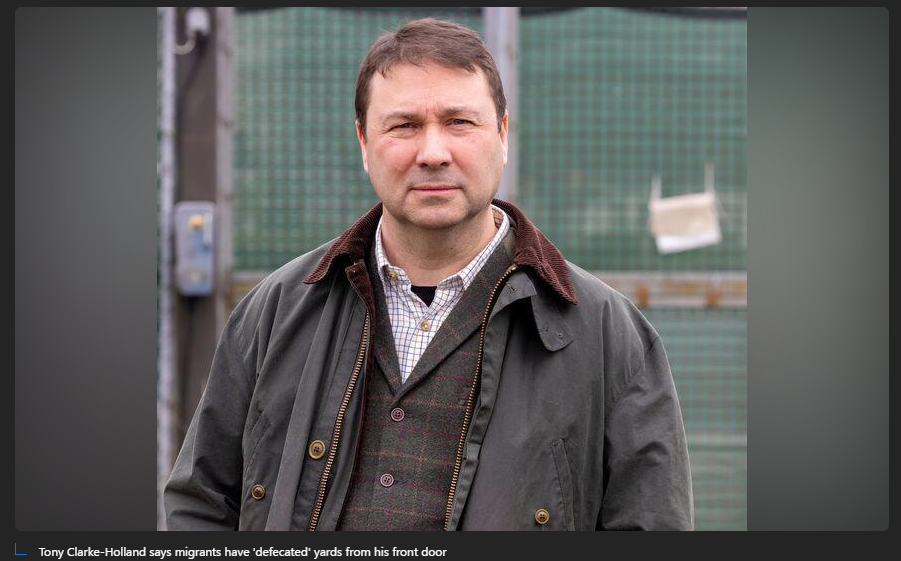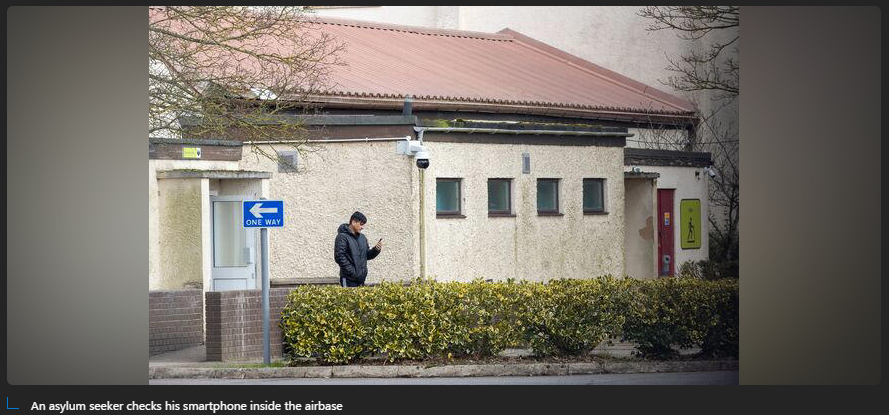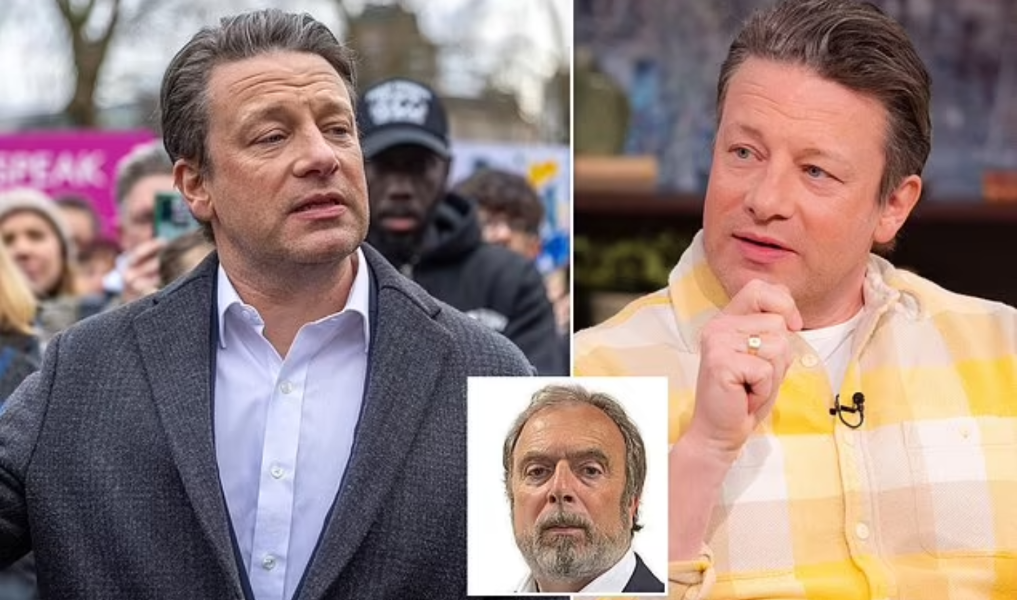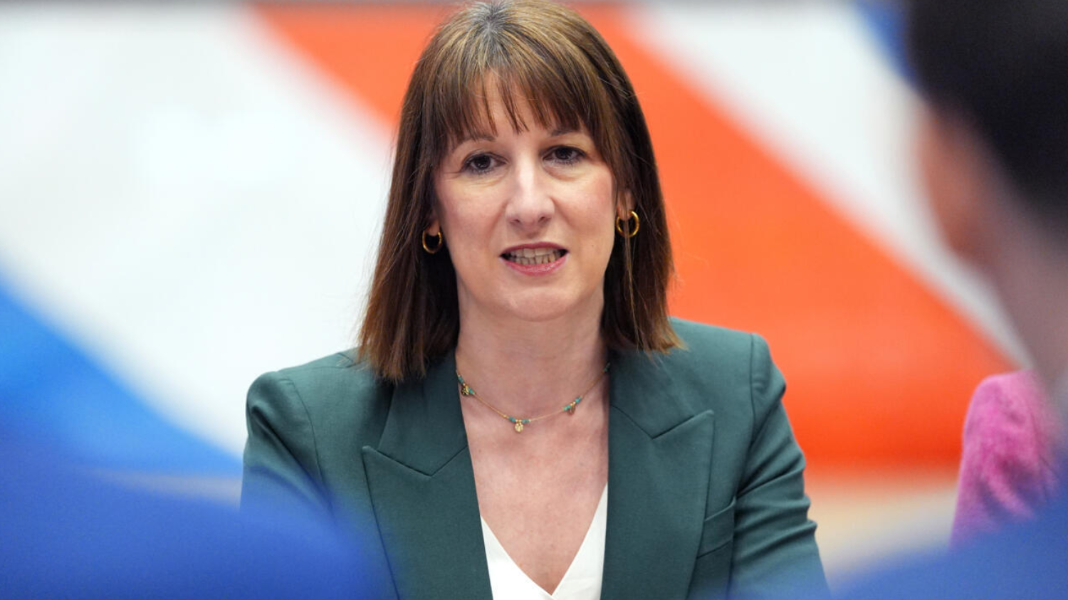-
Posts
10,807 -
Joined
-
Last visited
Content Type
Events
Forums
Downloads
Quizzes
Gallery
Blogs
Everything posted by Social Media
-
A terrifying ordeal in West Wales when a Jewish-Israeli music producer, Itay Kashti, was lured from London under false pretenses and violently kidnapped. The three men responsible—Faiz Shah, 23, Mohammad Comrie, 23, and Elijah Ogunnubi-Sime, 20—have now been sentenced to over eight years in prison each after their meticulously planned attack was thwarted. Kashti was invited to what he believed was a legitimate music workshop at a secluded property in the Brynteg area of Llanybydder. The perpetrators posed as representatives of a reputable music production company and used stolen identities to rent the property and arrange a taxi for their unsuspecting victim. When Kashti arrived on August 26 last year, the men, masked and prepared for violence, launched their assault. The attackers also targeted the taxi driver but were forced to abandon their plan when he managed to escape, knowing he would alert the authorities. Police later discovered the three men hiding in nearby fields, leading to their arrest and subsequent guilty pleas to charges of kidnap. Judge Catherine Richards, sentencing the trio at Swansea Crown Court, described the crime as "motivated by events taking place elsewhere in the world" and highlighted the extensive planning involved. "None of you knew the victim," she told them. "He was an entirely innocent, hard-working music producer that you had identified as a victim based on your understanding of his wealth and his Jewish heritage." She imposed a 15-year restraining order alongside their prison terms. The judge detailed the sophisticated nature of the crime, revealing that the perpetrators had created false financial documents, used multiple mobile phones, and even developed escape routes. Messages between the attackers showed they had planned to drug Kashti with ketamine and had acquired an imitation firearm. When they attacked him, they handcuffed him to a radiator and threatened his life. The impact on the victim was profound. Recalling the terrifying experience, Kashti compared it to a national tragedy, saying, "As an Israeli, this incident felt like my own personal October the 7th." He described being kicked in the head, restrained, and told he would be killed if he tried to escape. "The awful attack of 7th of October was flashing through my mind as I lay restrained on the floor in handcuffs." Eventually, after his captors fled, he managed to free himself and call his wife, who alerted the police. Authorities later released images showing blood on the cottage floor and the cable ties used to bind him. Prosecutor Craig Jones revealed that messages between the kidnappers referred to Kashti’s perceived political stance and their lack of remorse. Their plot also included plans to launder extorted money through cryptocurrency. Items found in their possession included face masks, gloves, rental cars, a gag, blindfold, handcuffs, and cable ties—evidence of the chilling extent of their intentions. Mark Gardner, chief executive of the Community Security Trust (CST), expressed gratitude to prosecutors and law enforcement, emphasizing the gravity of the crime. "The combination of criminality and anti-Jewish hatred could easily have resulted in a far worse, perhaps even fatal outcome. We will continue to work with the police and all other partners to ensure the safety of our Jewish community and to bring perpetrators of antisemitism to justice." Inspector Gareth Jones of Dyfed-Powys Police acknowledged the traumatic impact on Kashti and his family. "This sentence today reflects the severity of this offence and the ordeal the victim suffered. We hope it gives the victim a sense of justice. We thank him for his strength, bravery, and patience whilst we carried out a thorough investigation into what was an extraordinary crime." Based on a report by BBC | Telegraphandargus 2025-03-17
-
China’s military has been spotted conducting drills with massive amphibious landing barges in the South China Sea, raising concerns that these specialized vessels could play a crucial role in a potential invasion of Taiwan. The footage, which surfaced on Chinese social media before being removed, shows the People’s Liberation Army Navy (PLAN) testing the Shuiqiao barges—large vessels equipped with retractable bridges designed to unload heavy military equipment onto enemy shores. BREAKING: China unveiled its new huge ”invasion barges” during an amphibious landing exercise near Zhanjiang. The barges will make it possible for China to move large amounts of military equipment to a shore without docking facilities. Ships would dock with barges, unload tanks, trucks and other armored vehicles which could then drive to shore across 120 meter long arm acting as a bridge. Such barges could be used for military operations against Taiwan, South Korea, Japan, the Philippines and other areas near the South China Sea. Reports indicate that between three and five of these barges were constructed in Guangzhou shipyard in southern China, each completed in just a few months despite development beginning in 2022. Their appearance in drills near Zhanjiang, Guangdong—600 miles from Taiwan—suggests China is refining its amphibious warfare capabilities. Naval analyst HI Sutton, who first reported on the barges in January, described them as “tailor-made for an amphibious assault.” He noted that while China might argue these ships have civilian applications, their size and purpose-built design make such claims unlikely. Dr. Emma Salisbury, a research fellow at the Council on Geostrategy, believes these barges could solve a long-standing logistical challenge for China in mounting a full-scale invasion. “A core problem for the PRC in invading Taiwan is getting the necessary heavy equipment over the Strait – and the solution to that problem is what we are seeing with these barges,” she told The Telegraph. “While landing forces on contested shores is always going to be difficult, these barges look to be ideal for moving tanks, armored vehicles, and the like quickly and safely on to shore.” Allowing information about these barges to reach the public, she added, underscores China’s growing threat in the region. The vessels perform a function similar to the U.S. military’s Joint Logistics Over-the-Shore system (JLOTS), which was used in an attempt to deliver aid to Gaza last year but was operational for only 20 days due to weather, technical, and security issues. However, not all analysts believe these barges will play a decisive role in an invasion scenario. Timothy R. Heath, a senior international defense researcher at RAND, pointed out that the slow-moving barges would be easy targets in a battle. “The slow-moving barges are easily targeted so they are unlikely to survive in the middle of a battle on the beaches,” he told The Telegraph. He noted that China already has military-grade amphibious assault ships that are better suited for deploying armored vehicles. Instead, Heath suggested that the barges might be intended for humanitarian missions in regions with poor port infrastructure. Despite this, defense analyst and former submariner Tom Shugart warned that Taiwan and the U.S. should remain on high alert. While the footage does not indicate an imminent attack, he wrote on X that concerns should grow “for when they’ve fully tested these and perhaps built many more.” China’s rapidly expanding naval capabilities are adding to these anxieties. A recent report from the Centre for Strategic and International Studies highlights that China has built the equivalent of the entire Royal Navy in just a few years, surpassing the U.S. Navy in sheer hull count and nearing its fleet tonnage. Between 2019 and 2023, Chinese shipyards in Dalian, Guangzhou, Jiangnan, and Hudong-Zhonghua collectively produced at least 39 warships—exceeding the Royal Navy’s total battle force fleet. With Beijing’s military ambitions continuing to grow, these developments signal an increasingly tense geopolitical landscape, particularly as China strengthens its ability to project power across the Taiwan Strait. Based on a report by The Telegraph 2025-03-17
-
Secretary of State Marco Rubio announced on Friday that South Africa’s ambassador to the United States, Ebrahim Rasool, is “no longer welcome” in the country. The decision marks another instance of the Trump administration’s increasing scrutiny of South Africa’s government. In a post on X, Rubio labeled Rasool a “race-baiting politician” who harbors disdain for President Donald Trump. He further declared the ambassador “persona non grata,” effectively barring him from U.S. diplomatic engagement. Rubio’s statement linked to a Breitbart article reporting on Rasool’s comments during a South African think tank’s webinar. In the virtual discussion, Rasool referenced Trump ally Elon Musk’s engagement with far-right figures in Europe, describing it as a “dog whistle” to a global movement of individuals who view themselves as part of an “embattled white community.” The State Department provided no additional details about Rasool’s ban, and it remained unclear whether the ambassador was in the U.S. at the time of the announcement. Rubio posted his statement while en route to Washington from a Group of Seven (G7) foreign ministers meeting in Canada. It is uncommon for the U.S. to expel a foreign ambassador, as persona non grata designations are typically reserved for lower-ranking diplomats. Even during periods of heightened tensions between the U.S. and Russia—such as the Cold War, Russia’s 2014 annexation of Crimea, allegations of election interference in 2016, and the poisoning of a former Russian intelligence officer in Britain—Washington and Moscow refrained from expelling each other’s ambassadors. Efforts to obtain comment from the South African Embassy in Washington were unsuccessful, as phone calls made toward the end of the workday went unanswered. Rasool, who previously served as South Africa’s ambassador to the U.S. from 2010 to 2015, had only recently returned to the post in January. His background includes a long history of anti-apartheid activism; as a child, he and his family were forcibly evicted from a Cape Town neighborhood designated exclusively for white residents. He later became a political figure in Nelson Mandela’s African National Congress, even serving time in prison for his activism. His expulsion coincides with Trump’s recent executive order cutting aid and assistance to South Africa’s Black-led government. In the order, Trump argued that South Africa’s Afrikaner population—descendants of mainly Dutch colonial settlers—were being unfairly targeted by a newly passed law permitting the government to expropriate private land. South African officials have denied that the law is racially motivated, instead framing it as a means to rectify the injustices of apartheid-era land dispossession. Trump, however, has characterized the law as discriminatory, referring to Afrikaners as “racially disfavored landowners.” His administration also announced plans to offer Afrikaners refugee status in the U.S., despite the fact that no land has yet been expropriated under the law. The Expropriation Act, signed by South African President Cyril Ramaphosa earlier this year, grants the government authority to seize land in cases where it is underutilized or where redistribution serves the public interest. It is intended to address historical inequities stemming from apartheid, when Black South Africans were forcibly removed from their lands and relegated to racially designated areas. Musk, who was born and raised in South Africa and now heads Trump’s Department of Government Efficiency, has frequently criticized the law on social media, portraying it as a direct threat to the country’s white minority. His stance has fueled further controversy over the issue, as the Trump administration continues to shape its foreign policy toward South Africa. Based on a report by NYP 2025-03-17
-
A 42-year-old transgender woman accused of hurling Molotov cocktails at vehicles and defacing a Tesla dealership in Loveland, Colorado, has been identified as Lucy Grace Nelson, also known as Justin Thomas Nelson. According to sources, Nelson lives with her mother due to "emotional problems" and refers to herself as "baby" online. Nelson allegedly carried out multiple acts of vandalism at the dealership, spray-painting offensive graffiti on company signs and vehicles, including phrases such as “Nazi cars” and “f—k Musk,” a direct attack on Tesla CEO Elon Musk. The suspect was arrested on February 24 after returning to the dealership, allegedly carrying additional incendiary devices and materials used for vandalism. Police described the graffiti as “offensive and hateful in nature.” Nelson, who is listed as female on her driver’s license and police booking records, now faces a federal charge of malicious destruction. She was released on a $100,000 cash bond. Federal authorities have declined to clarify whether she is being prosecuted as male or female. Nelson’s father, Claiborne “Jerry” Nelson, 82, told *The Post* that his daughter changed her name a few years ago and has struggled to maintain employment. “He’s in his early 40s but has been living with his mother, who has been taking care of him,” Claiborne said. “He has emotional problems. He hasn’t been able to keep a job.” While Nelson’s motivations remain unclear, social media posts and police documents provide some insight into her activities. A police affidavit includes screenshots of Facebook posts showing a burning Nazi flag and a masked selfie. In other posts, Nelson documented her gender transition, writing, “baby got her first bra… behold the power of socks” and “baby got her first dress” alongside images of herself in feminine clothing. A Reddit account under Nelson’s full name, which has since been suspended, posted in October 2023, “all bigots should be killed,” before clarifying, “morally speaking, that is… don’t actually because going to prison sucks.” The Loveland Police Department confirmed that the incendiary devices found at the scene were dangerous and not mere fireworks. “I know that there’s been some rumors that it was just fireworks and bottle rockets, and that is not the case. That is not true,” said Chris Padgett, a police spokesperson. “The devices that were discovered had potential for serious damage.” Authorities began investigating in late January after Tesla’s Loveland dealership was vandalized on three separate occasions. When Nelson was arrested, she was found with gasoline, spray paint, empty liquor bottles, and cloth soaked in accelerant inside her car. At least four cars, valued at a total of $220,000, had been targeted with firebombs, according to the arrest affidavit. Photos from a criminal complaint filed by the Bureau of Alcohol, Tobacco, Firearms, and Explosives show Tesla signs and Cybertrucks defaced with spray paint, as well as small fires across the dealership lot, believed to have been started by Molotov cocktails inside vodka bottles. Surveillance images captured Nelson throwing explosives at the vehicles. The attacks coincide with an online movement called #TeslaTakedown, which urges shareholders to divest from Tesla and encourages car owners to sell their vehicles. The movement, associated with actor Alex Winter of *Bill & Ted* fame, opposes Musk’s role in President Trump’s cost-cutting task force, DOGE, which has eliminated over 62,000 federal jobs since January. However, Winter’s *Rolling Stone* op-ed does not promote violence. President Trump addressed the Tesla attacks on Tuesday, stating that future acts of vandalism against Tesla facilities would be classified as “domestic terrorism.” He emphasized, “They’re harming a great American company.” As the case against Nelson unfolds, the investigation continues into whether the attacks were politically motivated or part of a broader anti-Tesla movement. Based on a report by NYP 2025-03-17
-
Three months into his second term, President Trump has reached the highest approval rating of his presidency, while more Americans believe the country is on the right track than at any time since 2004, according to a new NBC News poll released Sunday. The survey found that 47% of voters approve of Trump’s job performance, an all-time high in the poll, although 51% still disapprove. Trump previously reached 47% approval in early 2020, just before the COVID-19 pandemic, and again in October 2018. Despite this historic high, the president has not won over a majority of Americans, and 54% disapprove of his handling of the economy—marking the first time he has lost a majority on that issue in NBC’s polling. Still, voters generally feel Trump is delivering “the right kind of change” on key issues, including his controversial tariffs. The poll found that more Americans support his trade policy (41%) than oppose it (38%), even after a stock market selloff following his decision to impose sweeping tariffs—25% on Canada and Mexico and 20% on China. His immigration policies remain the most popular, with 56% of respondents saying they are a positive change. Government spending cuts were also well received, with 47% approving compared to 29% opposing. Even in areas where Trump has faced significant opposition, such as his approach to the Ukraine war and NATO, more people view his actions positively than negatively—41% and 40%, respectively. On inflation, 40% said his policies are having a positive impact, while 30% believe they are making things worse and 28% see no effect. The poll underscores the sharp partisan divide surrounding Trump. His approval among Republicans stands at a staggering 90%, while only 4% of Democrats support him. According to NBC, this marks the widest gap in partisan approval for a president in the last 80 years. NBC’s findings align with other recent polls. The latest RealClearPolitics average puts Trump’s approval rating at 48.2%, significantly higher than where he stood at this point in his first term (44%). However, it remains below where former President Joe Biden was at the same point in his presidency (53%). In another boost for Trump, 44% of registered voters now believe the country is on the right track—the highest percentage since President George W. Bush was in office two decades ago. While 54% still believe the country is headed in the wrong direction, the shift represents a significant improvement from the previous administration. In September of last year, only 28% of voters said the nation was on the right track, while 65% believed it was on the wrong path. One of Trump’s most significant actions in his second term has been the creation of the Department of Government Efficiency (DOGE), a move that has drawn fierce protests from government employees and backlash from Democrats. While the department remains unpopular overall (47% negative versus 41% positive), voters are split on whether it was a good idea, with 46% in favor and 40% opposed. Trump has remained steadfast in his support of DOGE and Elon Musk, backing the cost-cutting initiative as a way to reduce the federal deficit. Perhaps the most striking development in the poll is the dramatic decline in the Democratic Party’s favorability. Only 27% of voters view the party positively, while 55% have a negative opinion—the worst numbers for Democrats in NBC News’ polling history. Based on a report by NYP 2025-03-17
-
More than 200 alleged members of Venezuela’s Tren de Aragua gang have been deported from the United States to a high-security prison in El Salvador, despite a federal judge’s order attempting to block their removal. The deportation flights had already left US airspace before the order took effect. El Salvador’s President Nayib Bukele confirmed the arrival of 238 Tren de Aragua members along with 23 alleged members of the MS-13 gang on Sunday morning. He shared the news on social media, mocking the legal challenge to the deportations. "Oopsie... Too late," Bukele posted, appearing to taunt the judge’s ruling. Today, the first 238 members of the Venezuelan criminal organization, Tren de Aragua, arrived in our country. They were immediately transferred to CECOT, the Terrorism Confinement Center, for a period of one year (renewable). The White House also reacted, with press secretary Karoline Leavitt posting on X that "these heinous monsters were extracted and removed to El Salvador where they will no longer be able to pose any threat to the American People." US Secretary of State Marco Rubio praised Bukele, calling him "the strongest security leader in our region." The deportations followed an executive action by President Trump, who declared that Tren de Aragua was "conducting irregular warfare" against the United States. Using the Alien Enemies Act of 1798, Trump authorized the removal of its members. However, on Saturday evening, US District Judge James Boasberg in Washington, DC, issued a 14-day halt on deportations covered under Trump’s proclamation. When informed that some flights had already taken off, Boasberg verbally ordered them to return, but his written ruling did not explicitly include that directive. The official notice appeared in court records at 19:25 EDT on Saturday (00:25 GMT on Sunday), though it remains unclear exactly when the planes left US airspace. A senior Trump administration official later stated that legal advisors determined the judge’s ruling was not applicable because the flights had already reached international waters. "They were already outside of US airspace," the official told Axios. "We believe the order is not applicable." The US Department of Justice has since appealed Boasberg’s ruling, according to CBS News. Meanwhile, the BBC has reached out to the department for further comment. This latest deportation underscores the growing diplomatic relationship between the US and El Salvador. In February, Rubio made El Salvador one of his first visits after becoming Secretary of State, during which Bukele initially offered to take in US deportees. The move was seen as part of a broader effort to justify the cost of the massive Cecot prison facility. Trump’s second-term immigration crackdown has intensified, with these deportations forming part of his broader push to remove undocumented immigrants. In January, he signed an executive order designating Tren de Aragua and MS-13 as foreign terrorist organizations. His campaign promise to launch the largest deportation operation in US history was a key part of his re-election platform, and this latest move signals his administration’s commitment to fulfilling that pledge. Based on a report by BBC 2025-03-17
- 136 replies
-
- 12
-

-

-

-

-

-
President Trump says he has ordered a “decisive” military action against Houthi rebels in Yemen, opening a new salvo against the Iran-backed group that has targeted shipping lanes in the Red Sea. Trump said the US would deploy “overwhelming lethal force” against the group “until we have achieved our objective.” “They have waged an unrelenting campaign of piracy, violence, and terrorism against American, and other, ships, aircraft, and drones,” Trump wrote on Truth Social. He said US personnel were carrying out aerial attacks on Houthi bases, leaders and missile defenses “to protect American shipping, air, and naval assets, and to restore Navigational Freedom.” “No terrorist force will stop American commercial and naval vessels from freely sailing the Waterways of the World,” Trump wrote. Trump approved the Houthi strike plan — which he requested to be drawn up several weeks ago — late last week, and the final order was given on Saturday to begin what officials describe as a sustained attack on the group’s positions in Yemen. Further actions after Saturday will depend on battle damage assessments from this series of strikes, a US defense official told CNN. But there is expected to be more action against the Houthis over the next several weeks. A larger campaign of strikes took time to organize and plan because the US had to collect the intelligence necessary for more sweeping attacks against the Houthis, and that took a considerable amount of time. A senior military official recently told CNN the intel collection required for broader strikes had been completed. The US has been working to degrade Houthi capabilities for months as the entity worked to disrupt international shipping lanes in the Red Sea, one of the world’s busiest waterways, calling the attacks a response to Israel’s war in Gaza against Hamas. The group has targeted more than 100 ships and vessels, including with drones, missiles and small ships. The Biden administration sought to respond by carrying out targeted strikes on Houthi positions in Yemen, including attacking underground weapons storage facilities in October and November, but the actions did not prevent further attacks. The Houthis had previously promised to stop attacks on ships in the Red Sea so long as the ceasefire deal between Israel and Hamas was maintained. For more than a year, the group had carried out attacks on cargo ships in what it called revenge against Israel for its military campaign in Gaza, leading to a protracted crisis in the sea’s busy shipping corridor. “This ban will continue until the crossings into the Gaza Strip are opened and its needs for food and medicine are allowed to enter,” the Houthis said on Tuesday. “This is not a one off. This is the beginning of an ongoing series of events that will last days if not weeks,” a source familiar with the strategy told CNN. “There is not and will not be an invasion or troops on ground. But there will be a series of ongoing strategic targeted attacks.” Earlier this year, Trump signed an order designating the Houthis a “foreign terrorist organization.” Trump, in his message, said the Biden administration’s approach to the Houthis was “pathetically weak, so the unrestrained Houthis just kept going.” Based on a report by CNN 2025-03-16
-
An inflammatory troll post making numerous false claims and flames has been removed @6Hugh_Janus9 For such a new poster I suggest you head here and do some reading first: https://aseannow.com/forum_rules/ The topic here: Democrats Face Backlash for Supporting Arrested Palestinian Activist Mahmoud Khalil
-

RFK Jr. Warns Against Vaccinating Chickens for Bird Flu - Instead?
Social Media replied to connda's topic in Covid/Vaccine
This topic has been //Closed// as its already running here: -
Wethersfield, a quaint village about 50 miles from London, is a picture of English tradition. Neatly maintained houses line country roads leading to a small village green, a school, and the historic St. Mary Magdalene Church, which dates back to the 13th century. But in a field just beyond the village, a young man, Middle Eastern in appearance, sat against a hedge, absorbed in his phone. When approached, he startled, scrambling to his feet and fleeing toward the trees. The old airbase at Wethersfield now serves as an asylum camp, housing adult men who have come from countries such as Afghanistan, Eritrea, Iran, Iraq, and Syria. Many arrived in the UK via the English Channel, crossing in small boats before seeking asylum. Currently, 580 men reside there, with the number set to increase to 800. The government initially announced a target of 1,700 but has since remained vague on the final figure. Before the camp opened, Wethersfield had a population of just 707. The site was originally intended for a prison, an idea met with local opposition. When the plan shifted to an asylum center, villagers were assured it would be temporary. Few believed it. “They’re talking about up to 1,800 people, which is more than twice the population,” said a woman who had moved to Wethersfield from East London. Though she slightly exaggerated the potential number, her concerns were real—soon, the camp’s population could surpass that of the village itself. The people of Wethersfield remain civil, embodying the English tradition of politeness. They do not express overt hostility toward the asylum seekers. Their frustration is directed at the government, both Conservative and Labour, as well as the bureaucratic inefficiency of the Home Office. Still, they cannot deny that life in Wethersfield has changed. Locals report that the asylum seekers loiter in groups along footpaths and trespass on farms. Some have reportedly defecated on village lanes, and despite government efforts to educate them on British customs, villagers claim to have seen some watching children in playgrounds. Security footage captured an attempted house break-in, and one villager recounted, “One tried to burgle the pub.” When asked whether they feared a rise in crime, the villagers hesitated to answer. In England, discussions on migration and crime tread dangerous ground. Everyone is aware of the past scandals involving mass immigration and crime spikes, such as the infamous grooming gangs that targeted young girls across the UK. However, speaking too candidly can have consequences. Prime Minister Keir Starmer has labeled anti-immigration concerns as “far right,” and under the Online Safety Act of 2023, British citizens have faced legal consequences for blunt discussions on social media. Vice President J.D. Vance even criticized Britain for its crackdown on free speech. Some villagers refused to talk about the camp. Those who did speak did so anonymously, wary of repercussions. Their fears were not unfounded. One resident, living near the back gate of the base in a house with countryside views, admitted she could not sell her home—buyers had no interest in a property next to an asylum center. “We hear helicopters, ambulances, and sirens all the time,” she said. “They’re fighting amongst each other in their cells.” When asked if she felt safe, she hesitated. “I’ve got my adult son living here. Luckily, my daughter doesn’t anymore, so that’s good. But our neighbors have younger children.” Would she let her daughter walk alone? “No, probably not.” She didn’t need to explain why. At the Fox on the Green pub in Finchingfield, the barmaids had been instructed to stay silent on the issue. But Sam, a local customer, pointed the way: “You want to speak to Greg Meat.” Greg, a fifth-generation farmer, preferred to go by “Greg the Egg” and had been a lifelong Tory—though lately, he was drawn to Nigel Farage’s Reform UK party. He had already attended three of their meetings. “So far, I’ve liked what I’ve heard.” The conversation mirrored others from migration hotspots across Europe and beyond. From the Italian and French coastlines to the streets of Amsterdam, Paris, and Phoenix, Arizona, communities are struggling with the effects of mass immigration. Across the West, anti-immigration parties are gaining ground, and nations are tightening their borders. The pattern is familiar: migrants are placed in hotels or temporary camps while governments scramble to respond. Once-traditional voters are turning to nationalist movements for solutions. British asylum law requires proof that applicants face persecution in their home countries due to race, religion, nationality, political beliefs, or identity. Some asylum seekers exploit this, claiming religious conversion for asylum. In 2022, 72% of applicants citing LGBTQ+ status were approved. Others have claimed Christianity as a means to stay. Liverpool Cathedral has seen so many Iranian asylum seekers seeking baptism that it established a Persian congregation, baptizing over 300 converts by 2017. Former Home Secretary Suella Braverman alleged in 2024 that “churches around the country” were “facilitating industrial-scale bogus asylum claims.” Yet, successful asylum seekers make up only 11% of UK immigrants. The rest come seeking better economic opportunities. In Wethersfield, villagers remain skeptical. One woman recounted how she had entered the village church and found Iranian asylum seekers preparing for baptism. “They’ve been taken under the wing of a local reverend,” she said. “They’re getting ready to be baptized.” While Iran does suppress Christianity, few in the village believed the conversions were genuine. Reverend Alex Shannon of St. Mary Magdalene declined to discuss the matter, stating, “As a church, we aim to serve all the people of the community. It’s a political issue. We’re not involving ourselves in any public comment.” One resident summed up the village’s predicament: “If people are still coming across the Channel, either they open up more of these places or they jam more people into the ones they’ve already got, right?” She paused, then added, “What’s too many?” The silence that followed was telling—perhaps she already knew the answer. Based on a report by Daily Express | FP 2025-03-15
-

Wealthy Britons Flee to Italy and Greece Ahead of Tax Hike
Social Media posted a topic in World News
A growing number of wealthy British families are rushing to relocate to Italy and Greece before April 5 to avoid the upcoming tax reforms set to take effect in the new financial year. With Labour’s inheritance tax increases, higher capital gains tax, and the abolition of the non-dom regime on the horizon, financial experts report a surge in UK taxpayers seeking lower-tax alternatives abroad. Under the new rules, all UK residents will be taxed on their global income and gains, and the remittance basis—where tax is only paid on money brought into the UK—will be eliminated. Meanwhile, frozen income tax thresholds, which push more people into higher tax brackets, will remain unchanged until at least 2028-29. The remittance basis had allowed non-domiciled individuals to avoid UK tax on foreign income, provided they did not bring the money into the country. However, maintaining this status came with an annual charge of £30,000 for those who had been UK residents for at least seven of the previous nine tax years, and £60,000 for those residing in Britain for 12 of the past 14 years. Chris Etherington, from accountancy firm RSM, noted that Mediterranean countries like Italy and Greece are attracting high-net-worth individuals due to their favorable tax regimes, which resemble the soon-to-be-defunct non-dom rules in Britain. Christopher Groves, a partner at international law firm Withers, reported a "huge spike" in clients relocating to Italy, with many scrambling to leave before the tax year ends. "It’s important to make sure you’re gone by April 6 if you’re going to leave next year. You need to have found your villa in Marbella or apartment in Monaco," he said. Groves added that the tax changes had forced many to accelerate their departure plans, often in a rushed and unstructured manner. “The changes to non-dom and inheritance tax rules have pushed lots of people who didn’t have a real plan to leave the UK to bring that forward, which means they’re doing things in a less well thought-through way. The world is so small these days, so it feels like a relatively easy step to take, but there can be practical difficulties.” UK residency is automatically granted to individuals who spend 183 or more days in Britain during a tax year, but moving abroad does not necessarily eliminate UK tax obligations. Some individuals may qualify as non-residents by meeting automatic overseas tests, such as spending fewer than 16 days in the UK if they had not been a resident for the past three years or fewer than 46 days if they had been non-residents for three consecutive years. However, those who fail to meet these tests may still be considered UK residents based on ties such as family, property, or employment. With Britain’s tax burden at its highest level in 70 years and expected to rise further, the 40% inheritance tax has become a key factor motivating many to relocate. Groves highlighted the disparity with other countries: “We’re so out of step [with other nations]. You can go to Italy and [inheritance tax] is single digits if anything, in Switzerland it’s nothing. Here, 40% above £325,000 is confiscatory by comparison.” The Office for Budget Responsibility estimates that up to 20% of non-doms may leave the UK due to these tax changes. However, it’s not just non-doms making the move. Wealthy Britons, regardless of residency status, are seeking tax-friendly destinations. In 2024 alone, Britain lost 10,800 millionaires to overseas migration—more than double the number who left in 2023. Research by the Adam Smith Institute suggests that each millionaire who departed last year would have contributed at least £393,957 in annual income tax—an amount equivalent to the tax payments of 49 average earners. Meanwhile, the Saltus Wealth Index found that more than a quarter (28%) of individuals with investable assets exceeding £250,000 are considering leaving the UK within the next year. The Treasury was approached for comment on the exodus of Britain’s wealthy but has yet to respond. Based on a report by The Telegraph 2025-03-15 -
An eight-mile stretch of protected Amazon rainforest has been cleared to make way for a new four-lane highway, intended to facilitate travel for the upcoming COP30 climate summit in Belem, Brazil. Drone footage reveals wide dirt paths cutting through the dense greenery, while heavy machinery paves over wetlands in what is considered the world's most biodiverse region. The road is meant to ease congestion for the expected 50,000 attendees, including world leaders. Logs have been seen stacked along the cleared land, marking a stark contrast to the original plans. The state government of Pará had previously scrapped the project, known as Avenida Liberdade, due to environmental concerns. However, preparations for COP30 reignited the proposal, leading to its swift approval. Adler Silveira, Pará’s infrastructure secretary, justified the road’s construction, calling it an “important mobility intervention” and a “sustainable highway.” He emphasized the lasting benefits for the local population and the necessity of accommodating COP30 attendees. President Luiz Inácio Lula da Silva defended the decision, stating that the summit would be “a COP in the Amazon, not a COP about the Amazon.” He insisted the event would highlight the region’s needs while demonstrating the federal government’s commitment to its protection. Despite these assurances, critics argue that cutting down parts of the Amazon—an essential carbon sink—directly contradicts the summit's climate-focused mission. Local residents have voiced their frustrations, fearing long-term consequences. Claudio Verequete, who lives just 200 meters from the highway, expressed his dismay. “Our harvest has already been cut down. We no longer have that income to support our family,” he told the BBC. He also noted that he has received no compensation from the government and worries that the road’s construction will encourage further deforestation. Adding to the community’s concerns, the highway is expected to be walled off, potentially cutting off access for those living nearby. “For us who live on the side of the highway, there will be no benefits. There will be benefits for the trucks that will pass through. If someone gets sick and needs to go to the center of Belém, we won’t be able to use it,” he added. This development comes amid broader environmental crises in the Amazon. In August 2024, vast fires swept through the Amazon, Cerrado savannah, and Pantanal wetland, with many ignited intentionally to clear land. At the same time, the Amazon River reached record lows for the second consecutive year, prompting emergency aid efforts for affected communities. A major tributary of the river in Brazil fell to its lowest recorded level, exacerbating the region’s growing environmental distress. Meanwhile, climate summits themselves face scrutiny over their environmental impact, particularly regarding the use of private jets by world leaders and corporate executives. At COP28 in Dubai, an estimated 291 private flights linked to the event generated 3,800 tonnes of CO2—equivalent to the annual emissions of over 500 people. Alethea Warrington, head of energy, aviation, and heat at climate action charity Possible, criticized the hypocrisy. “Travelling by private jet is a horrendous waste of the world’s scarce remaining carbon budget,” she told *The Times.* “Each journey produces more emissions in a few hours than the average person emits in an entire year.” Similar patterns were observed at COP27 in Egypt, where dozens of private jets landed in Sharm el-Sheikh and Cairo. The popular Gulfstream G650, a frequent choice for summit attendees, burns nearly 1,900 liters of fuel per hour, producing 23.9 tonnes of CO2 on a five-hour flight. Factoring in non-CO2 emissions at high altitudes, a single Gulfstream flight to COP27 may have generated over 45 tonnes of CO2—more than an average person emits annually. At COP29 in Baku, Azerbaijan, the trend escalated. A staggering 65 private jets arrived in the week leading up to the summit, nearly double the number recorded at COP28. Within just two days, 45 flights landed as the conference commenced. Warrington condemned the double standards: “For CEOs who claim to care about tackling the climate crisis, using a private jet to get to COP shows blatant hypocrisy.” Despite public backlash, government officials have defended their travel choices. A UK government spokesperson maintained that their delegation’s flight to COP27 was “on one of the most carbon-efficient planes of its size in the world” and that emissions were being offset. However, environmentalists argue that such assurances ring hollow when world leaders continue to rely on private jets, contradicting the very essence of these climate summits. Based on a report by BBC | Daily Mail 2025-03-15
-
Prime Minister Keir Starmer is scrambling to secure an economic agreement with President Trump before the end of the month to prevent sweeping tariffs that could undermine efforts to boost the British economy. With the US imposing global tariffs of 25 percent on steel and aluminium imports on Wednesday, industry leaders in the UK have warned that the measures will be “hugely damaging.” Despite attempts to negotiate an exemption during a phone call with Trump earlier this week, Starmer was unsuccessful in persuading the US president to spare Britain from the tariffs. Nevertheless, the prime minister has decided against imposing retaliatory tariffs, unlike the European Union, amid concerns that such a move could jeopardize the prospect of a broader economic deal with Washington. Trump is preparing to extend the tariffs, with a 25 percent levy on imports from countries that impose VAT on US goods, which includes the UK. These “reciprocal tariffs” are expected to take effect on April 1. Speaking in the Oval Office during a meeting with Irish Taoiseach Micheal Martin on Wednesday, Trump made his stance clear. “We’ve been abused for a long time, and we will be abused no longer,” he said. “I am not happy with the European Union. We’re going to win that financial battle.” Last month, during Starmer’s visit to the White House, Trump indicated that Britain could be granted an exemption if a deal on artificial intelligence and other critical technologies could be reached. Now, with the April 1 deadline—dubbed “World Tariff Day” in Whitehall—rapidly approaching, the UK is intensifying efforts to strike a deal. Business Secretary Jonathan Reynolds will travel to Washington next week for talks with Commerce Secretary Howard Lutnick and Trade Representative Jamieson Greer. Government sources remain optimistic, citing similarities in the UK and US approaches to artificial intelligence. While the EU is pushing for strict regulations on AI, the UK has opted for a more flexible approach, relying on voluntary commitments from tech firms. Starmer sees AI as a key driver of economic growth and has held off on introducing AI regulation legislation pending the outcome of the negotiations. The government is hopeful that this stance will align with US priorities and pave the way for a deal. The EU, by contrast, responded to the steel tariffs by announcing countermeasures targeting €26 billion worth of US goods, including bourbon, motorbikes, and industrial and agricultural products. European Commission President Ursula von der Leyen defended the decision, stating, “The European Union must act to protect consumers and business. The countermeasures we take today are strong but proportionate.” At Prime Minister’s Questions, Starmer said that Britain would take a “pragmatic approach” to dealing with the White House. “I am disappointed to see global tariffs in relation to steel and aluminium, but we will take a pragmatic approach,” he told MPs. “We are, as he knows, negotiating an economic deal which covers and will include tariffs if we succeed. But we will keep all options on the table.” However, government insiders suggest that the UK is unlikely to retaliate against the US. Instead, officials are focusing on measures to prevent an influx of cheap steel, originally destined for the American market, from being “dumped” in the UK, further destabilizing the domestic steel industry. A Whitehall source claimed that Britain is in a “much better place” than the EU when it comes to negotiations. “They don’t have any cards to play,” the source said. “We do.” The strained relationship between Trump and the EU is another factor, with the US president previously asserting that the European bloc was designed to “screw the United States.” James Murray, the Exchequer Secretary to the Treasury, urged caution, telling Times Radio that ministers must remain “cool-headed.” “We think that the best way for the UK to respond is with a cool-headed, pragmatic, productive response working with the US, whilst at the same time making absolutely clear that we will stand up for British industry and all options are on the table,” he said. With time running out, Starmer’s government is working urgently to secure a deal that would shield the UK from Trump’s sweeping tariffs while maintaining a strong economic relationship with the US. Based on a report by The Times 2025-03-15
-
Who will be the one to tell Jamie Oliver that dyslexia may not exist? And when they do, will the famous chef be relieved to be freed from this supposed burden, or will he be upset? Most likely, the latter. Dyslexia, much like its equally debated counterpart ADHD, is one of those rare conditions people seem eager to claim. Neither has an objective, testable, or scientifically verifiable diagnosis, yet both come with certain advantages for those labeled with them. Individuals diagnosed with dyslexia may receive special accommodations, including extended time for exams, the assistance of a scribe, or access to specialized software and modified test papers. There are even free or discounted laptops equipped with spelling support software. Similarly, ADHD diagnoses can grant access to untaxed welfare benefits that are not means-tested. Prescriptions for stimulant medication—closely related to illegal amphetamines—are readily available and even circulate in black markets. Fortunately, there is no specific pill for dyslexia yet. This is a thriving industry, with an estimated 870,000 children in Britain classified as dyslexic. Given the scale of the industry, criticism is often met with outrage. This is why figures like Jamie Oliver, who openly identify as dyslexic, receive widespread praise. The celebrity chef is set to present a documentary on dyslexia for Channel 4 later this year, a move hailed as courageous. But is it truly brave? The real minority in this debate may not be those who claim to have dyslexia, but those who question its very existence. Speaking on the BBC, Oliver described his school years as happy but admitted he struggled with reading, writing, and spelling. He famously left school with just two GCSEs. "I was running away from words, from reading and writing. I thought it was just me. But there were hundreds of thousands of us every year." He expressed concern that children like him suffer from declining self-esteem before the age of ten. His experience is undoubtedly real—struggling to read can make school miserable. But is the explanation really dyslexia? No universal definition or objective test for dyslexia exists. Every child who struggles to read faces different challenges, yet the solution often remains the same: synthetic phonics (SP), a time-tested method in which children learn to associate sounds with letters. This is how reading was traditionally taught before so-called modern methods emerged. One London teacher, Hungarian-born Eva Retkin, maintained for years that she could teach any child to read as long as they knew the alphabet. When challenged by a national newspaper, she proved her claim. Even at 80, long past retirement, she continued to teach reading with remarkable success. "I always had about 30 pupils in my class, so I assume a few of those were dyslexic, if that's what you want to call it, but it made no difference. They all learned to read before secondary school. Every single one of them." This aligns with findings from two respected academics, Professor Julian Elliott of Durham University and Professor Elena Grigorenko of Yale University. Their book *The Dyslexia Debate* dismantles the notion of dyslexia as a distinct condition, pointing out that there is no agreed definition or diagnostic standard. Despite this, society continues to discuss dyslexia as if it were an undisputed fact. Parliament’s Science and Technology Select Committee reached a similar conclusion in 2009, stating, "There is no convincing evidence that, if a child with dyslexia is not labelled as dyslexic, but receives full support for his or her reading difficulty, that the child will do any worse than a child who is labelled dyslexic and then receives special help." The reason is simple: both groups receive the same intervention. But as Elliott and Grigorenko note, being labeled dyslexic is often seen as advantageous. It can grant access to additional resources, exam accommodations, and most importantly, relieve parents, teachers, and children of any perceived responsibility. The real issue is not with the children. They are not to blame. The failure lies elsewhere. As American author Rudolf Flesch argued in *Why Johnny Can’t Read*—a book published 70 years ago—the root of the problem is flawed teaching methods. The widespread adoption of "look and say" reading strategies in the 1930s and 1940s replaced traditional phonics, leaving generations of children struggling to read. Despite overwhelming evidence in favor of phonics-based instruction, resistance remains. A seven-year study in Clackmannanshire, Scotland, confirmed the effectiveness of synthetic phonics in teaching literacy. Since 2005, English schools have been legally required to use SP, yet many teachers remain reluctant. Opposition still comes from "progressive" educators who see SP as rigid and joyless. A recent paper by Charlotte Hacking and Dominic Wise criticizes phonics, arguing that its strict structure stifles children's learning. Until phonics-based teaching is fully embraced, the dyslexia industry will likely continue to thrive. And as long as that happens, the number of "dyslexic" children in Britain will remain high—even though, with proper instruction, many of them could learn to read just like any other child. Based on a report by Daily Mail 2025-03-15
-
The UK economy unexpectedly contracted by 0.1% in January, with a slowdown in manufacturing playing a significant role in the decline. The latest figures mark a disappointing start to the year, particularly after December’s stronger-than-expected 0.4% growth. The weaker-than-anticipated performance is likely to be seen as a setback for the government, which has emphasized economic growth as its primary objective. The figures arrive just ahead of the Chancellor's Spring Statement, where government spending cuts are expected to be a key feature. The decline occurred in the same month that the Chancellor delivered a major speech outlining her vision for economic growth, including her support for the expansion of Heathrow Airport. However, despite these ambitions, businesses braced for the financial impact of upcoming employment policy changes included in Ms. Reeves’s Budget. In October, the Chancellor announced that employer contributions to National Insurance and the minimum wage would both increase in April, adding pressure on businesses already dealing with economic uncertainty. ONS director of economic statistics Liz McKeown commented on the decline, stating, “The fall in January was driven by a notable slowdown in manufacturing, with oil and gas extraction and construction also having weak months. However, services continued to grow in January, led by a strong month for retail, especially food stores, as people ate and drank at home more.” The data paints a complex picture of the UK economy, with growth in services unable to offset declines in key sectors. With economic policy changes on the horizon and spending cuts looming, the coming months will be critical in determining whether the UK can regain its growth momentum. Based on a report by BBC | X 2025-03-15
-
A United Nations judge was found guilty on Thursday of trafficking a young woman to the United Kingdom and subjecting her to forced labor. Lydia Mugambe, a 49-year-old Ugandan judge, "exploited and abused" the victim, prosecutors argued, forcing her to work as an unpaid maid and caregiver while preventing her from seeking legal employment. A jury convicted Mugambe of multiple charges, including facilitating illegal immigration, forced labor, and witness intimidation, as reported by the Independent. Thames Valley Police @ThamesVP Lydia Mugambe, a UN & Ugandan judge, has today been convicted of bringing a woman into the country illegally & then forcing her to work as a slave. Mugambe tried to evade justice by claiming she had diplomatic immunity, which has now been removed Despite being under police scrutiny, Mugambe was appointed in May 2023 as a judge on the U.N. International Residual Mechanism for Criminal Tribunals. This appointment came three months after law enforcement had been called to her residence in Oxfordshire. At the time, Mugambe was pursuing a Ph.D. in law at Oxford University. The prosecution argued that Mugambe conspired with Ugandan diplomat John Leonard Mugerwa in a deceptive arrangement. Mugerwa allegedly facilitated the victim’s entry into the UK under false pretenses with the help of the Ugandan embassy, while Mugambe sought to use her influence to sway a judge overseeing a case involving Mugerwa. Mugambe denied all allegations, maintaining that she had treated the victim with "love, care, and patience," according to the BBC. Her reaction at the time of her arrest was captured in footage released by Thames Valley Police. When confronted in the kitchen of her home in Kidlington, Mugambe gasped and insisted the victim had willingly asked to work for her. "I even have immunity. I am not a criminal," she protested, before shifting blame onto the victim, whom she had deceived into traveling to Britain and then subjected to forced labor. At Oxford Crown Court, the jury found Mugambe guilty of conspiring to breach UK immigration laws, compelling forced labor, and conspiring to intimidate a witness. A majority guilty verdict was also delivered on an additional charge of arranging or facilitating travel for the purpose of exploitation. During the trial, Prosecutor Caroline Haughey KC condemned Mugambe’s actions, stating, "Lydia Mugambe has exploited and abused (her alleged victim), taking advantage of her lack of understanding of her rights to properly paid employment and deceiving her as to the purpose of her coming to the UK." Mugambe now faces sentencing, marking a significant fall from grace for a judge once regarded as a champion of human rights. Based on a report by Daily Mail | Independent 2025-03-15
-
The government is struggling to meet its manifesto pledge to recruit 6,500 new teachers, as shortages in the profession hit record highs. According to the National Foundation for Educational Research (NFER), teacher vacancies in England have surged to their highest levels since records began, casting doubt on the government’s ability to deliver on its promises. In its latest report, published on Thursday, the charity revealed that unfilled teaching positions increased by over 20% in the 2023/24 academic year, with six vacancies per 1,000 teachers—double the pre-pandemic rate and six times higher than in 2010/11. This crisis has also led to a rise in class sizes, with 15% of secondary school pupils now in classrooms of more than 30 students, up from 14.7% the previous year and 10% in 2015/16. The National Education Union (NEU), the UK’s largest teaching union, has warned that unless urgent action is taken, the government will fail to meet its recruitment target before the end of this Parliament. Daniel Kebede, general secretary of the NEU, criticized the lack of progress, stating, “The Government made noises on the campaign trail that they would commit to tackling recruitment and retention. The NFER points to the current trajectory being inadequate to the task.” He also stressed the urgency of the situation, saying, “The Government was elected in the hope it would value education. [It] has a limited window if it hopes to solve the teacher recruitment and retention crisis within this Parliament. The clock is ticking.” The concerns were echoed by Pepe Di’Iasio, general secretary of the Association of School and College Leaders, who warned that incremental efforts would not be enough to solve the crisis. “The Government must heed this warning before it is too late. We are far beyond the point where small steps and half measures can address the scale of the recruitment and retention crisis in education,” he said. While he acknowledged that the government’s target of recruiting 6,500 new teachers was a positive step, he criticized the lack of a clear strategy, saying, “Success will require action on a scale far greater than anything seen so far.” To meet its target, the government has pledged £450 million to attract new teachers, funded by applying VAT to private school fees. However, the NFER has urged ministers to introduce additional measures in the upcoming spring spending review. It argued that the Department for Education’s (DfE) proposed 2.8% pay rise for teachers in England next year would provide some relief but warned that more substantial increases or financial incentives would be required to meet recruitment goals. Previous research by the charity indicated that achieving the target purely through salary increases would require two consecutive years of 10% pay rises, costing the public purse £4.9 billion by 2028. In addition to pay increases, the NFER suggested that targeted incentives, such as enhanced bonuses for teachers in subjects experiencing severe shortages and improved bursaries for trainee teachers, could help mitigate the crisis. Jack Worth, co-author of the NFER report, emphasized the urgency of government action. “Teacher recruitment and retention in England remain in a perilous state, posing a substantial risk to the quality of education,” he warned. “The time for half measures is over… The Government now faces a critical ‘now or never’ moment for delivering on its pledge to address teacher shortages by recruiting 6,500 additional teachers by the end of the Parliament.” Government data published in December highlighted the extent of the shortfall. While 88% of the initial teacher-training target for primary schools was met in 2024/25—down from 94% the previous year—secondary school recruitment lagged significantly behind. Ministers reached just 62% of their postgraduate secondary recruitment target, failing to meet hiring goals for 12 out of 17 secondary school subjects. The NFER report warned that under-recruitment was likely to persist into the following year, exacerbating the ongoing crisis. A spokesperson for the Department for Education defended the government’s efforts, stating, “Recruiting and keeping great teachers in our classrooms is vital to improving life chances for all children. We are committed to resetting the relationship with the education workforce and working alongside them to re-establish teaching as an attractive, expert profession.” They highlighted ongoing efforts, including a £233 million investment next year to attract more teachers in key subjects such as maths, physics, chemistry, and computing. The spokesperson also pointed to measures aimed at improving teacher retention, noting, “On top of the 5.5% pay award announced last year we are also taking steps to support teachers’ wellbeing and ease workload pressures including encouraging schools to allow their staff to work more flexibly so more teachers stay in the profession.” With teacher shortages continuing to rise and class sizes growing, the pressure is mounting on the government to take decisive action. The upcoming spending review will be a crucial moment to determine whether ministers can turn the tide on teacher recruitment or if the crisis will deepen further in the years ahead. Based on a report by The Telegraph 2025-03-15
-
Portugal, Western Europe’s least affluent nation, is on the brink of yet another government shake-up, fueled largely by rising discontent over immigration. The country has become a magnet for digital nomads and affluent expatriates, leading to surging living costs and growing support for the far-right. Lauren Clark, a 32-year-old British freelance writer, moved to Lisbon five years ago and credits the relocation for her flourishing career in wellness and lifestyle journalism. “The lifestyle is definitely the main drawing point, for sure. The food is amazing. Obviously, the weather’s gorgeous. It’s very easy to make friends,” she says. She enjoys working from a co-working space where she can meet new people, something that was difficult in London due to high costs. Portugal has embraced an influx of foreign residents in recent years, hoping to benefit economically from remote workers and high-spending expats. The foreign population has doubled in the past five years, reaching a record one million in 2023. However, this rapid rise in immigration has led to a strong backlash from locals as housing prices and living expenses soar. Political instability has followed, with the country now facing its third snap election in as many years. Prime Minister Luís Montenegro, leading a minority center-right government, lost a vote of confidence amid corruption allegations. Meanwhile, immigration concerns have propelled the far-right Chega party from the political fringes to near the center of power, with its vote share jumping from less than 1% in 2019 to 18% last year. Although new arrivals have contributed to Portugal’s economic growth, many locals remain frustrated. Unlike manufacturing-heavy economies like Germany, which have stagnated, Portugal has seen a post-pandemic economic boom, partly driven by immigration. “From an economic point of view, the increase in population and attraction of some well-educated workers is certainly positive, particularly in a country like Portugal,” says Ricardo Amaro, an economist at Oxford Economics. Historically, Portugal has suffered from a brain drain, with young professionals leaving for better opportunities in countries like Germany and the UK. Now, immigration has not only stabilized the population but reversed its decline. “The number of inward migrants has increased quite significantly, and the number of outward migrants has stabilized at lower levels than during the global financial and sovereign debt crisis,” Amaro explains. In 2023, Portugal’s population grew by approximately 123,000, reaching 10.6 million. That year, an estimated 189,367 people immigrated to Portugal, far outpacing the 33,666 who left. This influx consists of diverse groups, including immigrants from Portuguese-speaking countries like Brazil and Angola, wealthy retirees from Europe, and digital nomads. Portugal’s relatively easy citizenship process—allowing residency seekers to apply after five years—has also made it an attractive entry point into the EU. While the economy has benefited, with GDP rising by 1.9% in 2023—outpacing France, Germany, and the UK—immigration has coincided with rising rents, interest rates, and overall living costs. Between 2021 and 2023, rents in Lisbon alone skyrocketed by 43%, far surpassing increases in many other European capitals. Inflation once peaked at 10% annually, leaving many locals feeling worse off despite wage growth. Even Clark, who moved before the recent wave of newcomers, has noticed the shift. “The prices have just gone quite crazy, with rents and property costing a lot,” she says. “What has also happened is that you have these brunch places that rather than sell an espresso for 50 cents that locals are used to, offer matcha lattes for €5. It has created a bit of a ghost town in the middle of Lisbon where there are not many locals anymore. Increasingly, it doesn’t feel as authentic.” The growing economic disparity has fueled discontent, contributing to the rise of the far-right, especially during a cost-of-living crisis. Amaro explains, “It does create a challenge for governments with discontent. Partly, this is also what’s behind the rise of the far-right, especially in a cost-of-living crisis.” Portugal’s shift mirrors political trends in other countries, such as the U.S., where high inflation played a role in Kamala Harris’s defeat by Donald Trump, despite a strong economy under Joe Biden. In Portugal, analysis suggests that the far-right’s growing support comes primarily from deprived rural areas and young men mobilizing to vote. In cities, even the far-left has criticized digital nomads and mass tourism for driving up rents and gentrifying neighborhoods. With Portugal ranking lowest in GDP per capita among Western European nations and its minimum wage still below the EU average despite recent increases, frustration among locals continues to mount. Lisbon’s previous government actively encouraged foreign investment and residency through tax incentives and golden visas—policies now at the center of public anger. Foreigners like Clark have started feeling the shift in public sentiment. “I do feel that kind of hostility. It is this really tricky situation. A lot of Portuguese people are struggling. There has been a lot more tension.” Charlie Baron, who manages three co-working spaces in Lisbon, has also noticed a change. “It has definitely got harder in the past 12 months for new nomads to find their footing—there is a bit more of a clampdown,” he says. “It used to be one of the cheapest places to be a digital nomad in the world, but now places like Thailand are very competitive. Over the last three years, rents have gone up about 50%—for a one-bed, it is now around €1,000, or maybe €500 to share a place.” He believes locals are more concerned about illegal immigration, though tensions over both wealthy and poorer newcomers remain. As Portugal heads into yet another election, immigration and its impact on the cost of living remain the dominant issues shaping the country’s future. Based on a report by The Telegraph 2025-03-15
-
Several Labour-led local authorities in the UK have decided to divest pension funds from British defence companies, despite government efforts to promote investment in the arms industry. At least nine councils have made the move, which appears to be influenced by pro-Palestinian activism, particularly in areas with significant Muslim populations. Chancellor Rachel Reeves has been advocating for greater investment in defence firms as part of a strategy to strengthen Britain’s industrial base. This push aligns with wider European efforts to bolster security in response to Donald Trump’s call for the continent to take greater responsibility for its own defence and military support for Ukraine. However, some Labour councils are going in the opposite direction, choosing to withdraw funding from companies involved in arms production. One councillor, speaking to *The Telegraph*, admitted that although the policy was crafted to appeal to pro-Palestinian voters, mentions of Gaza were deliberately omitted from official discussions. Last week, Dudley council in the West Midlands became the latest authority to approve divestment, arguing that withdrawing millions from arms manufacturers could “contribute towards peace.” The motion was supported by Labour and Liberal Democrat councillors. Labour’s stance on the Israel-Gaza conflict has already caused electoral damage. In the July 2024 general election, the party lost several historically strong seats to candidates running on pro-Palestinian platforms. The upcoming May 1 local elections have further increased pressure on Labour councils, particularly in areas with large Muslim populations. Two of the councils that have withdrawn investments are in the West Midlands, home to the second-largest Muslim population in the country after London. Four London councils—Camden, Islington, Tower Hamlets, and Waltham Forest—have also followed suit in recent months after sustained lobbying from pro-Palestinian groups. However, Islington council has since paused its divestment plans due to legal concerns over pension funds' obligations to generate financial returns for investors. Meanwhile, Avon Pension Fund, which oversees £6 billion in public sector pensions, is set to review £14 million worth of defence investments later this month after pressure from Bristol and North Somerset councils. The fund will assess whether to pull out from seven companies supplying equipment to the Israeli military. In November, Manchester City Council, under Labour leadership, voted to pressure its pension provider to cut ties with arms manufacturers. If implemented, this could significantly reduce defence investments from the UK’s largest local government pension investor. Reports suggest that more councils are planning similar votes in the coming months, potentially resulting in millions being divested from major British defence companies, including BAE Systems and Lockheed Martin’s UK operations. The move has drawn criticism from defence officials and political figures. Lord West, the former First Sea Lord, condemned the councils’ actions, accusing them of weakening national security. “They obviously aren’t that interested in the defence of our people, which will come back and bite them,” he warned. “Our defence firms are there to help protect us, as much as the people who actually join the military.” Labour previously voted against a Conservative-led bill that aimed to ban councils from engaging in boycotts and divestment campaigns. The legislation failed to pass before the 2024 general election. A Labour source insisted that the party opposes boycotts and sanctions, describing the council votes as a “genuine threat to the two-state solution.” Defence Secretary John Healey has also criticised the boycott attempts, calling them “fundamentally flawed,” even if motivated by good intentions. Shadow Local Government Secretary Kevin Hollinrake accused Labour councils of “inflaming community tensions” and harming the UK’s economy and defence sector. “If Labour were on the side of the British people, they would bring back our bill to stop this right now. Their silence speaks volumes,” he said. As Labour grapples with internal divisions and voter pressure, the debate over defence investments is set to remain a contentious issue in the coming months. Based on a report by The Telegraph 2025-03-15
-
A Connecticut woman has been accused of holding her severely malnourished stepson captive for more than 20 years before he set a fire in a desperate bid for freedom. Authorities have described the shocking case as “something out of a horror movie.” Kimberly Sullivan, 56, was arrested and charged Wednesday, nearly a month after a fire at her Waterbury home revealed the unimaginable conditions her 32-year-old stepson had been enduring. According to police, he weighed only 68 pounds when he was rescued by firefighters on February 17. The victim, who had been held in a cramped storage space, admitted to intentionally setting the fire to escape. “I wanted my freedom,” he told first responders as he was treated for smoke inhalation and burns. He claimed he had been held captive since he was around 11 years old, deprived of food, water, and even basic medical care. An investigation by police and the Waterbury State’s Attorney’s Office uncovered details of severe neglect and abuse. The man told authorities he often resorted to drinking from a toilet because he was only given two cups of water a day as a child. He recalled stealing food at school and even eating from the garbage before he was eventually removed from the education system. As he grew older, his living conditions worsened. The victim stated that he was forced to relieve himself in bottles and newspapers, further highlighting the horrific treatment he endured. “The facts of this case, quite frankly, are something out of a horror movie,” said Supervisory Assistant State’s Attorney Don Therkildsen. “That’s without exaggeration.” He also noted that the victim was fully aware he could have died in the fire but saw no other way out. Despite the overwhelming allegations, Sullivan’s attorney, Ioannis Kaloidis, has denied the claims. “The allegations are horrific, but they are simply that: allegations,” Kaloidis stated. “They’re allegations made by one person that are largely uncorroborated by any independent evidence.” Following her arrest, Sullivan was photographed in handcuffs, wearing a cross necklace and flanked by investigators. She faces multiple charges, including first-degree assault, second-degree kidnapping, first-degree unlawful restraint, cruelty to persons, and first-degree reckless endangerment. “The suffering this victim endured for over 20 years is both heartbreaking and unimaginable,” said Waterbury Police Chief Fernando Spagnolo in a statement. Neighbors described Sullivan and her family as reclusive. Zeffery Guarnera and Suzette Baker, who live next door, said they never saw the victim outside. However, their daughter, now 25, recalled seeing a boy in the window of the room where the fire eventually broke out over a decade ago. “He waved at her, she waved at him, she didn’t think nothing of it,” Guarnera recounted. “And hasn’t seen him since.” Guarnera also speculated that he may have seen the victim working in the yard over the years without realizing who he was. “Maybe actually a little bit older… but I guess if he looked emaciated, he might have looked younger,” he said. The case has sent shockwaves through the community as authorities continue their investigation. Based on a report by NYP 2025-03-15
-
In the first 50 days of Donald Trump’s return to the White House, Immigration and Customs Enforcement (ICE) has arrested 32,000 migrants—70% of whom have either been convicted of crimes or are facing charges, according to senior agency officials. The surge in enforcement has already pushed ICE detention centers to full capacity, with all available beds across the country now occupied. Among those detained, 14,000 are convicted criminals, 10,000 have pending charges, and 8,700 have no known criminal records in the U.S. Acting ICE Director Todd Lyons made it clear that this is just the beginning. “We expect these ICE arrests and removal numbers will only go up as we unleash an agency that had its hands tied behind its back for the last four years,” he said. ICE has not disclosed how many migrants have been deported so far. However, the scale of arrests under Trump has already reached nearly a quarter of the total 114,000 arrests made throughout the entire previous year. “President Trump campaigned on border security enforcement, the American people voted on it, and we are delivering it beyond anyone’s expectations,” said Lyons. Agency officials have also accused the Biden administration of inflating ICE arrest numbers by counting “tens of thousands” of migrants who were only processed and released back into U.S. communities without actual immigration enforcement. “The previous administration counted these arrests, even though no immigration enforcement action was taken,” Lyons claimed. With the rapid increase in detentions, ICE has filled 47,600 beds and is now requesting additional funding from Congress to expand its capacity. The administration is also seeking help from other federal and local agencies with available detention space. In an effort to manage limited resources, the Trump administration has introduced a self-deportation option using the new CBP Home phone application, allowing migrants to voluntarily leave the country. Meanwhile, some detainees with serious medical conditions or other humanitarian concerns have been released with tracking devices such as ankle monitors. Despite these measures, officials insist they are not reviving “catch and release” policies. Among those arrested so far, ICE has identified 1,155 suspected gang members, 44 foreign fugitives, and 29 individuals classified as known or suspected terrorists. With Trump’s immigration enforcement strategy in full force, the number of ICE arrests and deportations is expected to climb even higher in the coming months. Based on a report by NYP 2025-03-15


